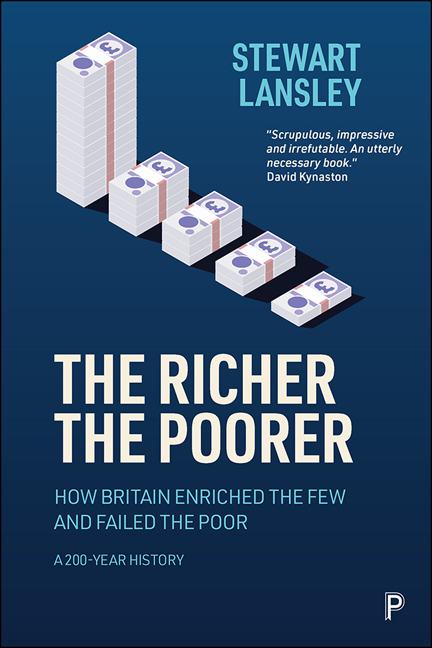Book contents
- Frontmatter
- Miscellaneous Frontmatter
- Dedication
- Epigraph
- Contents
- List of figures
- Preface and acknowledgements
- Introduction: Knighthoods for the rich, penalties for the poor
- PART I 1800–1939
- PART II 1940–59
- PART III 1960–79
- PART IV 1980–96
- PART V 1997–2010
- PART VI 2011–20
- Afterword: COVID-19 and ‘the polo season’
- Notes
- Index
- Frontmatter
- Miscellaneous Frontmatter
- Dedication
- Epigraph
- Contents
- List of figures
- Preface and acknowledgements
- Introduction: Knighthoods for the rich, penalties for the poor
- PART I 1800–1939
- PART II 1940–59
- PART III 1960–79
- PART IV 1980–96
- PART V 1997–2010
- PART VI 2011–20
- Afterword: COVID-19 and ‘the polo season’
- Notes
- Index
Summary
Despite being a minority government, Labour made several improvements to the benefits system. The most important was a controversial innovation that was to have a significant positive impact on the living standards of families, even if it had to be wrestled out of a reluctant leadership. In both 1974 manifestos, Labour committed to the measure campaigned for by CPAG, a new tax-free child benefit for all children to replace child tax allowances and family allowances.
This commitment was incorporated in the 1975 Child Benefit Act, passed with cross-party support. By then the living standards of families had been eroded by the falling value of benefits for children and a shift in the burden of taxation towards families. In the event, Harold Wilson resigned in March 1976. Faced with mounting economic problems, the new prime minister, Jim Callaghan, a former trade union official and a wily operator, was eventually forced into accepting a loan from the Washington-based International Monetary Fund (IMF). The loan –the largest the fund had ever given –came with a tough condition: significant public spending cuts. This was a painful political requirement that meant a cut in the ‘social wage’ –the gains to individuals from the provision of public services such as free education and healthcare. The social wage was a key part of the goal to provide all with a decent social minimum.
The battle for child benefit
Callaghan was concerned that transferring tax allowances, mainly benefitting fathers, to child benefit paid to mothers would further boost inflation-fuelled pay demands. As chancellor in 1967 he had backed the Treasury's pet scheme for a new means-tested benefit over raising the value of family allowances. As with the issue of equal pay, the male-dominated trade unions were far from cheerleaders for the move. Mostly representing well-paid workers, the union movement had a mixed record on campaigning for the low-paid and reducing pay differentials. They had supported free public services but were more lukewarm about in-work cash benefits, which some union leaders saw as undermining the negotiating rights of workers. As Jack Jones put it in 1972, over-reliance on benefits to fight poverty would make ‘virtual State pensioners of hundreds of thousands of ordinary healthy men and women’.
- Type
- Chapter
- Information
- The Richer, the PoorerHow Britain Enriched the Few and Failed the Poor: A 200-Year History, pp. 105 - 112Publisher: Bristol University PressPrint publication year: 2021



